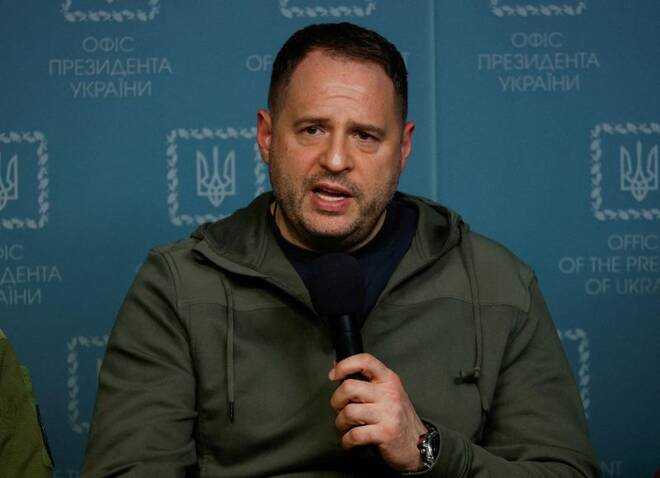Advertisement
Advertisement
Ukraine remembers Stalin-era famine as Russia war rages
By:
KYIV (Reuters) - Russia will pay for a Soviet-era famine that left millions of Ukrainians dead during the winter of 1932-33 and for its actions in the current war in Ukraine, the head of Ukraine's presidential administration said on Saturday.
By Dan Peleschuk
KYIV (Reuters) -Ukraine accused the Kremlin on Saturday of reviving the “genocidal” tactics of Josef Stalin as Kyiv commemorated a Soviet-era famine that killed millions of Ukrainians in the winter of 1932-33.
The remembrance day for the “Holodomor” comes as Ukraine is battling to repel invading Russian forces and deal with sweeping blackouts caused by air strikes that Kyiv says are aimed at breaking the public’s fighting resolve.
“Once they wanted to destroy us with hunger, now – with darkness and cold,” President Volodymyr Zelenskiy wrote on Telegram. “We cannot be broken.”
The Holodomor, which roughly translates as “death by hunger”, has taken on an increasingly central role in Ukrainian collective memory since the Maidan revolution in 2014 ousted a Russian-backed president and bolstered national consciousness.
In November 1932, Soviet leader Stalin dispatched police to seize all grain and livestock from newly collectivised Ukrainian farms, including the seed needed to plant the next crop.
Millions of Ukrainian peasants starved to death in the following months from what Yale University historian Timothy Snyder calls “clearly premeditated mass murder”.
“The Russians will pay for all of the victims of the Holodomor and answer for today’s crimes,” Andriy Yermak, the head of the presidential administration, wrote on Telegram.
Russia has targeted critical infrastructure across Ukraine in recent weeks through waves of air strikes that have sparked widespread power outages and killed civilians.
Millions of Ukrainians were still without power after fresh strikes this week, Zelenskiy said late on Friday.
“The winter is already difficult, and if everything continues the same way, then it will be very similar to what we read in history books,” Artem Antonenko, a 23-year-old marketing specialist, told Reuters in central Kyiv.
The Kremlin has denied that its attacks, which have only galvanized Ukrainian public anger, were aimed at civilians but said on Thursday Kyiv could “end the suffering” by meeting Russia’s demands to resolve the war.
In a statement on Saturday, Ukraine’s foreign ministry accused Moscow of reviving the tactics of the 1930s.
“On the 90th anniversary of the 1932-1933 Holodomor in Ukraine, Russia’s genocidal war of aggression pursues the same goal as during the 1932-1933 genocide: the elimination of the Ukrainian nation and its statehood,” it said.
Moscow denies the deaths were caused by a deliberate genocidal policy and says that Russians and other ethnic groups also suffered because of famine.
Ukrainians typically mark the memorial day, which was established after the country gained independence from the Soviet Union in 1991 and which falls on the fourth Saturday of November, by placing candles in their windows.
Pope Francis this week compared Russia’s war in Ukraine to what he called the “terrible genocide” of the Stalin-era and said Ukrainians were now suffering from the “martyrdom of aggression”.
Grain exports
Kyiv’s foreign ministry also condemned what it said were Russia’s current attempts to weaponize food by undermining a U.N.-brokered deal to unblock Ukrainian grain exports through the Black Sea.
NATO Secretary-General Jens Stoltenberg echoed a similar sentiment on Saturday when he addressed an International Summit for Food Security in Kyiv by video link alongside several other European leaders.
“Today, Russia is using hunger as a weapon of war against Ukraine, and to create division and further instablity among the rest of the world,” he said.
Russia’s ambassador to Turkey said on Friday that Moscow sends its representatives to more ship inspections in Istanbul per day than mandated under the Black Sea grain deal, rejecting a Ukrainian accusation that Russia is slowing down the process.
(Reporting by Dan PeleschukAdditional reporting by Yurii Kovalenko in Kyiv and Alan Charlish in WarsawEditing by Tom Balmforth and Frances Kerry)
About the Author
Reuterscontributor
Reuters, the news and media division of Thomson Reuters, is the world’s largest international multimedia news provider reaching more than one billion people every day. Reuters provides trusted business, financial, national, and international news to professionals via Thomson Reuters desktops, the world's media organizations, and directly to consumers at Reuters.com and via Reuters TV. Learn more about Thomson Reuters products:
Did you find this article useful?
Latest news and analysis
Advertisement
